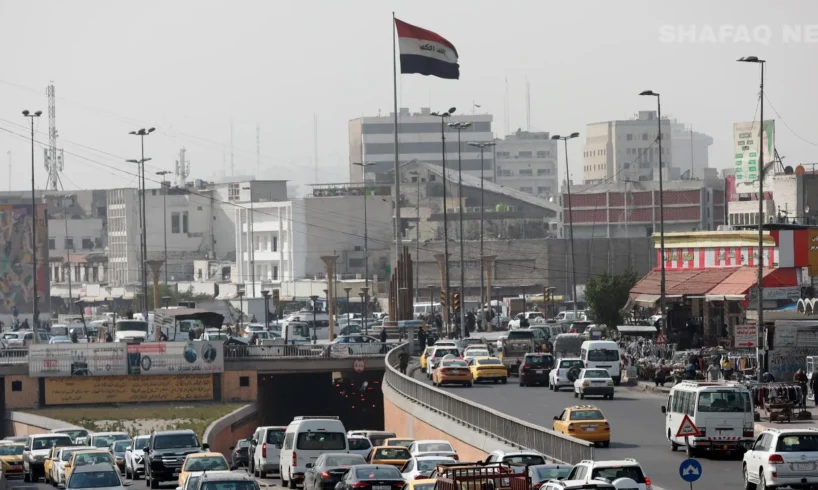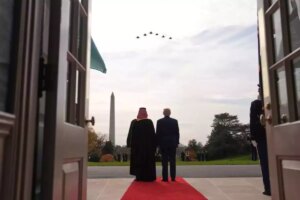
Shafaq News
The United
States has imposed sanctions on several Iraqi banks, companies, and businessmen
linked to Iran-backed armed groups, signaling a sharp escalation in economic
and political pressure on Baghdad. By restricting access to essential dollar
transactions, the measures have increased uncertainty over government budgets
and the functioning of state institutions.
The move has
deepened tensions within Iraq’s fragile political scene, raising concerns about
the country’s ability to manage these mounting challenges.
Government
Response
The
sanctions, announced by the US Treasury Department, targeted Al-Muhandis
General Company — the economic arm of Iraq’s Popular Mobilization Forces (PMF)
— along with several prominent bankers and firms suspected of links to Iran’s
Islamic Revolutionary Guard Corps (IRGC) and its Iraqi ally Kataib Hezbollah.
According to
the Treasury’s statement, the designated entities were involved in “corruption
and money-laundering networks” that financed armed groups operating inside and
beyond Iraq. In reaction, Baghdad formed a high-level national investigative
committee, including representatives from the Ministry of Finance, the Central
Bank, the Integrity Commission, and the Federal Board of Audit, to scrutinize
the basis of the sanctions.
In a
statement, Baghdad described the US action as “unilateral and regrettable,”
advocating instead for “the exchange of technical and banking information
rather than punitive measures.” The government also reaffirmed its rejection of
any external interference in Iraq’s internal affairs while emphasizing its
refusal to permit economic activity that supports groups operating outside the
law.
Dollar
Warzone
The
sanctions represent a direct threat to Iraq’s financial structure, noted Nawar
al-Saadi, professor of international economics, describing them as a “real
warning” to the economy. He explained that the measures do not target isolated
entities but create a cumulative negative impact on the investment and
financial environment.
“Iraq has
inadvertently become part of an economic battlefield between Washington and
Tehran,” al-Saadi observed to Shafaq News, stressing that the sanctions could
trigger a severe contraction in liquidity and disrupt a financial system
heavily dependent on the dollar.
He also
warned that the restrictions may provoke higher demand for dollars in parallel
markets, a depreciation of the dinar, delays or freezes in investment projects,
and difficulties securing trade shipments.
“This
represents a direct threat to the execution of the state budget and to salaries
if sanctions eventually target government-linked banks,” he highlighted, adding
that the current measures are not merely punishment of specific firms, but an
alarm bell for structural vulnerabilities in Iraq’s financial system.
Bank
Blacklist Grows
The new
sanctions form part of a steadily expanding wave of US measures over the past
two years targeting Iraq’s banking sector. In January 2024, the US Treasury
Department designated Al-Huda Bank a “financial institution of primary
money-laundering concern” and cut it off from dollar correspondent accounts,
signaling the start of a broader clampdown.
A year
later, in February 2025, Baghdad — in coordination with Washington — suspended
five more local banks from dealing in US currency: the Arab Islamic Bank,
United Investment Bank, Sanam Islamic Bank, Misk Islamic Bank, and Amin al-Iraq
Bank.
A 2025 World
Bank report estimated that more than thirty Iraqi banks have faced restrictions
or sanctions on dollar transfers due to suspected links with Iranian
institutions or groups connected to armed factions. The report highlighted that
the measures deepened Iraq’s liquidity shortage and limited government funding
for investment projects in an economy reliant on dollar-based oil and trade
revenues.
Read more: Iraq “first to suffer”: A scenario following Trump’s strike on Iran
Additionally,
the tightening has deterred foreign investors, unsettled markets, and widened
the gap between the official and parallel exchange rates of the dinar — eroding
purchasing power and pushing inflation higher.
In Baghdad,
each new US restriction is perceived not only as a financial measure but also
as part of a broader pattern of political and security pressure. That
perception has magnified the sanctions’ impact, fueling public concern and
debate over Iraq’s financial sovereignty and its ability to preserve stability
under growing external strain.
Security
Implications
Security
experts caution that the sanctions may signal the onset of a deeper escalation.
Strategic analyst Alaa al-Nashou suggested that such measures could precede
targeted military operations inside Iraq. “If these sanctions expand, they
could create widespread public fear,” he explained to Shafaq News.
Military
analyst Sarmad al-Bayati expressed similar concerns, noting that the sanctions’
security dimension is closely linked to recent accusations over attacks that
killed US soldiers. “The inclusion of Al-Muhandis Company in the sanctions
list, despite being under Iraq’s Federal Board of Supreme Audit, raises
questions about the accuracy of the US evidence and whether it relies on solid
intelligence or political considerations,” he noted.
Al-Bayati
added that maintaining the sanctions despite Iraq’s financial reforms during
the past two years has caused confusion within the banking sector and placed
undue pressure on financial institutions.
Political
analyst Aeed al-Hilali viewed the sanctions as carrying political weight equal
to their economic impact, suggesting they aim to erode Iraq’s sovereignty
through pressure on state institutions. He anticipated Prime Minister Mohammed
Shia al-Sudani’s government will engage in dialogue with Washington to limit
the repercussions while preserving internal stability.
Meanwhile,
Imran al-Karkoushi, a member of Nouri al-Maliki’s State of Law Coalition,
labeled the sanctions a “violation of Iraq’s sovereignty and independence in
security, politics, and the economy,” warning that the continuation of this
path could spark significant internal political and security tensions.
Tensions
intensified when US Congressman Joe Wilson posted on X shortly after the
sanctions announcement, hinting that similar measures could soon target the
Badr Organization, its leader Hadi al-Amiri, and Iraq’s state-owned Rafidain
Bank — accompanied by an hourglass emoji to imply that “time is running out.”
Wilson has
previously accused Rafidain Bank of conducting financial transactions with
Yemen’s Houthis Movement and threatened to suspend US funding to Iraq.
Written and
edited by Shafaq News staff.





